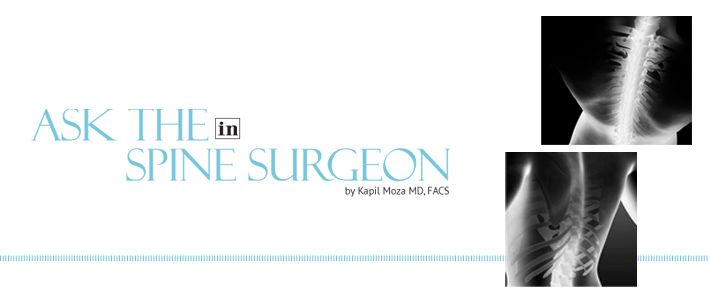HEALTH - PAIN FREE FOR LIFE
Ask the Spine Surgeon
February, 2016 - Issue #136
 |
Hi Dr. Moza. I've been diagnosed with lumbar degenerative disc disease. Not only am I in pain, but I've got to tell you - this is really affecting my psychological health. I thought I'd feel better once I found out what was causing all my discomfort, but I don't. I'm depressed. I feel like, at only 48, my life is over. I am afraid of not being able to live life the way I want to after surgery, and my quality of life has already taken a hit because my mobility and comfort is much more limited now. My wife is furious at me for putting off surgery, but I'm not convinced that it'll make any difference.
You have my deepest sympathies. First, let me tell you this: You are not alone. Tens of thousands of people are diagnosed with the same ailment every year and millions of Americans, like you, suffer from chronic pain.
But you don't have to. Here's what the vast majority of my patients tell me not long after surgery: "I can't believe how good I feel. I should have done this years ago." I will make this promise to you - you will feel so much better after we sit down and discuss your case. Knowledge is power - and it's time to take your power back over your pain.
For those of you reading along who might be unfamiliar, let me catch you up a bit. Lumbar degenerative disc disease is not actually a disease, but a neck pain it causes can still be immense. Whether due to injury or a result of aging, lumbar degenerative disc disease can limit your activity; some people require surgery.
Nerve openings in the spine become more narrow as discs are brought closer together due to a loss of water content. This water content can be lost due to disease or the result of aging. Since the water content is reduced, the discs can't absorb shocks as they should, especially when jumping, running or walking, which results in stiff neck pain. Disc degeneration can also be caused by incorrect body movements, poor posture and general wear and tear.
To my friend who wrote me about your pain: You don't mention that your disc disease was prompted by injury, so I'm going to assume that this is most likely a result of normal "wear and tear" - especially if, as you suggest, you're an active person.
Here's what I want you to know: Not all patients with low back pain require surgery. In fact, more than 95 percent find symptom relief through non-surgical therapies, such as exercise, medication, physical therapy and chiropractic care.
There's only one way to tell, though, if you need surgery - or a referral to a physical therapist I trust. Call my office immediately so I can do a thorough examination.
If you do need surgery, you and I have real options - all of them good. I've performed thousands of procedures and a full 100 percent of my patients have returned to their desired activity level afterwards. My micro-surgical techniques are minimally invasive; you'll be discharged from the hospital in less than 24 hours; you can take comfort in my near-0 rates of infection and complications; and you can sleep well knowing that my staff and I are only a phone call away if you have any questions.
More good news: You will be back up and moving the same day of your surgery. Most of my patients who undergo this procedure are back to desk work within a week or two and are comfortable exercising and engaging in recreational activities after eight to 12 weeks. Your incision will be so small, you'll be able to cover it with a small-sized bandage.
Kapil Moza, MD FACS
Diplomate, American Board of Neurological Surgery
Dr. Moza's Santa Clarita office is conveniently located in Valencia. 805-497-3622
Respected Neurosurgeon to Serve as Educator to Peers
Dr. Moza, long considered the premier surgical innovator in California and the nation, will be teaching a course to
spine surgeons in February. His topic: acculif cases. The board certified surgeon has performed more of these
procedures, which involve implanting an expandable cage, than any other specialist in the state.
|
||||||||||||||||||||||||||||




